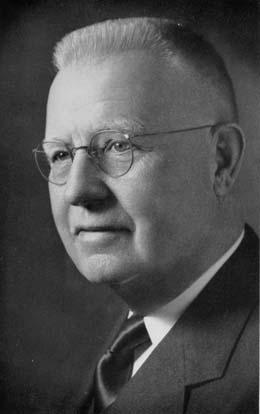Frank E. Holman was a Seattle-based trial lawyer, a senior partner in Holman, Mickelwait, Marion, Prince, and Black (in 2006, Perkins Coie). He was an authority on constitutional and treaty law, and a critic of the United Nations. Holman served as president of the Washington State Bar Association and of the American Bar Association. For outstanding service to the Seattle community "in leading the fight to defend the supremacy of the American Constitution as the law of the land" and for fighting to preserve the right to own and enjoy the use of private property both on the local and national levels, the Seattle-King County Association of Realtors named Frank E. Holman First Citizen of 1953.
This award came in the wake of growing anti-Communist sentiment in the nation and distrust of the United Nations among conservatives as a perceived threat to the sovereignty of the republic.
Early Years
Frank Holman was born in Sandy City, Utah, in 1886. A superb student, upon graduation from the University of Utah in 1908 he won a Rhodes scholarship to attend Oxford University. There he received his law education. He passed the Washington state bar in 1911 and the Utah bar the next year.
He returned to Utah where he became Dean of the Utah Law School (1913-1915) and in 1923 vice president of the Utah State Bar. He practiced law in Salt Lake City from 1915 to 1924.
The Move to Seattle
In 1924, weary from an ongoing allergy condition and troubled by the power in Utah of the Mormon church over religious, business, and legal concerns, he and his family moved to Seattle, where he began a new law practice. He eventually became senior partner in the firm Holman, Mickelwait, Marion, Prince, and Black (later, Perkins Coie). Holman was not content just to practice corporate law. He also served as President of the Seattle Bar Association in 1941.
During World War II, Holman, by now a pillar of the community, served his nation for two years as dollar-a-year chairman of the Alien Enemy Hearing Board for the Western District of Washington, and another year as a member of the National Panel of Alien Enemy Hearing Boards. Detained alien German, Italian, and Japanese nationals came before Holman's board and 100 others like it throughout the U.S.. These boards were charged with recommending to the attorney general whether the detainees should be released or interned for the duration of the war. About half the hearings resulted in release.
Post-war Years
In 1945 Holman served as president of the Washington State Bar Association. Three years later he ascended to the American Bar Association presidency.
Holman was an early skeptic of the new United Nations organization. Although not in wholesale opposition to the world body, he distrusted its potential misuse of power, fearing that UN treaty law would interfere in the internal affairs of the United States. In 1948, shortly after taking the reins of the American Bar Association, Holman ordered the organization's Committee on Peace and Law through the United Nations to examine several proposed treaties that would potentially have an impact on U.S. sovereignty.
The Bricker Amendment
This led to Holman's endorsement of the Bricker constitutional amendment. The proposed constitutional amendment (which never became law) was sponsored by Senator John W. Bricker, a conservative Ohio Republican. It was based upon the fear that the United Nations and the treaty process would be used by internationalists in the U.S. "as a law-making process to change the domestic laws and even the Government of the United States and to establish a World Government along socialist lines."
The amendment would invalidate any provision of a treaty that conflicts with the Constitution; allow a treaty to become effective as internal law only through legislation that would be valid in the absence of treaty; and authorize Congress to regulate all executive and other agreements with a foreign power or international organization. The amendment was popular among many people as the country lurched to the political right during the Cold War.
Holman's tireless effort to draw the nation's attention to the threats imposed by the newly formed United Nations took him on public speaking tours into 42 states and into the halls of Congress. Holman spent nearly a decade promoting the Bricker Amendment, in 1953 traveling more than 100,000 miles and making speeches in 16 states. Through his guidance the American Bar Association helped draft amended text for the amendment, which, however, never became law.
It was during this period that Robert Welch was forming the John Birch Society, a conservative group opposed to the country's membership in the United Nations and a self-perceived guardian against Communism. Although the two had much in common ideologically, Holman refused to join with Welch and his new organization because he believed Welch to be "intemperate," indulging in vilification of prominent people.
The World Court
Holman continued to fight for his ideals of national sovereignty until his retirement in 1961. His last big fight was an attempt to prevent the World Court's compulsory jurisdiction over U.S. internal affairs. The U.S. had joined the International Court of Justice in 1945, but under an amendment known as the Connally reservation, the government reserved the right to label any dispute being heard in the World Court as "domestic" and therefore beyond the jurisdiction of the court. Internationalists were now attempting to repeal the Connally reservation.
Poor health began to slow Holman's career, which came to a close in 1961 at the age of 76. During his retirement he published a detailed, if humble autobiography, The Life and Career of a Western Lawyer, 1886-1961. In it he revealed a professional life based upon the belief that "a strong, independent and true America is not only best for its own citizens but the best guarantee for world peace and world order."
Frank Holman died in 1967 at the age of 81.

